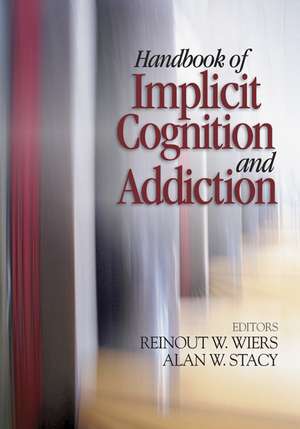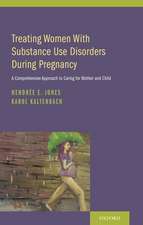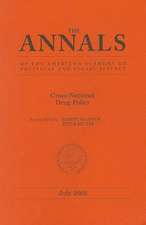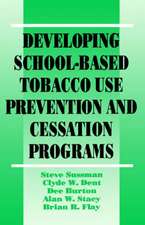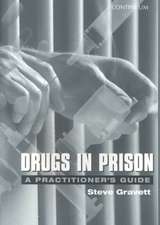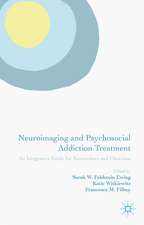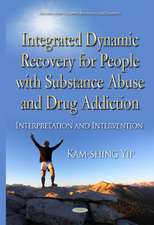Handbook of Implicit Cognition and Addiction
Editat de Reinout Wiers, Alan W. Stacyen Limba Engleză Hardback – 14 feb 2006
Preț: 1417.82 lei
Preț vechi: 1492.44 lei
-5% Nou
Puncte Express: 2127
Preț estimativ în valută:
271.29€ • 284.02$ • 224.48£
271.29€ • 284.02$ • 224.48£
Carte tipărită la comandă
Livrare economică 07-21 aprilie
Preluare comenzi: 021 569.72.76
Specificații
ISBN-13: 9781412909747
ISBN-10: 1412909740
Pagini: 560
Dimensiuni: 178 x 254 x 35 mm
Greutate: 1.14 kg
Ediția:New.
Editura: SAGE Publications
Colecția Sage Publications, Inc
Locul publicării:Thousand Oaks, United States
ISBN-10: 1412909740
Pagini: 560
Dimensiuni: 178 x 254 x 35 mm
Greutate: 1.14 kg
Ediția:New.
Editura: SAGE Publications
Colecția Sage Publications, Inc
Locul publicării:Thousand Oaks, United States
Recenzii
" The addiction field needs a fresh approach.... it will be a 'first.'"
"This book has the potential to pull together an important emerging area of research, frame the issues and future questions, and help develop ideas regarding prevention/intervention implications of this research. The addiction field has been moving in the direction of implicit cognition for some time, and I think that this volume has the potential to be the seminal contribution to the area."
"I believe the need for such a compendium of research in this relatively new field is fully justified….The goal and scope of the text is consistent with my own views of where the field needs to go….The editors have done an excellent job in assembling a world-class list of contributors."
"The editors have done a good job thinking of ways to make their volume distinctive….with the potential to wield a lasting impact on a field of immense social importance…Like the editors, I have a sense that important advances in our understanding of addictions will come from research that follows this handbook's title."
"I think the time is absolutely ripe for this book. The theories and methods of implicit cognition seem ideally suited to tap into the actual mechanisms of addiction, which involve low-level, unconscious cognitive processes that interact heavily with biological affective-motivational processes….the book is the first to synthesize this new, interdisciplinary field."
"I think the integration of implicit cognition and addiction is a novel idea for a handbook and one that is needed given the increasing rate of research using implicit measures to understand the processes involved in addictive behaviors."
"There is increasing interest in understanding the complexities of drug craving. The studies in this book probe beneath the surface of subjective ratings with sensitive measures of implicit craving, detecting important processes underlying decisions addicts make about drug use. Many researchers in addiction will find these analyses of the role of implicit processes in addiction valuable and timely."
"At more than 500 pages, with 34 chapters in seven sections, it is definitely a Handbook with a capital H. The editors have done a great job of rounding up the usual suspects who publish on these topics. They have also chosen excellent contributors whose previous work is more immersed in cognition than in addiction. The book is thorough and appreciative of history but remains focused on cutting-edge topic."
"This book is a valuable source for both researchers and practitioners who are either familiar or unfamiliar with implicit cognition and addiction" —Emmanuel Kuntsche, ALCALA
"This book has the potential to pull together an important emerging area of research, frame the issues and future questions, and help develop ideas regarding prevention/intervention implications of this research. The addiction field has been moving in the direction of implicit cognition for some time, and I think that this volume has the potential to be the seminal contribution to the area."
"I believe the need for such a compendium of research in this relatively new field is fully justified….The goal and scope of the text is consistent with my own views of where the field needs to go….The editors have done an excellent job in assembling a world-class list of contributors."
"The editors have done a good job thinking of ways to make their volume distinctive….with the potential to wield a lasting impact on a field of immense social importance…Like the editors, I have a sense that important advances in our understanding of addictions will come from research that follows this handbook's title."
"I think the time is absolutely ripe for this book. The theories and methods of implicit cognition seem ideally suited to tap into the actual mechanisms of addiction, which involve low-level, unconscious cognitive processes that interact heavily with biological affective-motivational processes….the book is the first to synthesize this new, interdisciplinary field."
"I think the integration of implicit cognition and addiction is a novel idea for a handbook and one that is needed given the increasing rate of research using implicit measures to understand the processes involved in addictive behaviors."
"There is increasing interest in understanding the complexities of drug craving. The studies in this book probe beneath the surface of subjective ratings with sensitive measures of implicit craving, detecting important processes underlying decisions addicts make about drug use. Many researchers in addiction will find these analyses of the role of implicit processes in addiction valuable and timely."
"At more than 500 pages, with 34 chapters in seven sections, it is definitely a Handbook with a capital H. The editors have done a great job of rounding up the usual suspects who publish on these topics. They have also chosen excellent contributors whose previous work is more immersed in cognition than in addiction. The book is thorough and appreciative of history but remains focused on cutting-edge topic."
"This book is a valuable source for both researchers and practitioners who are either familiar or unfamiliar with implicit cognition and addiction" —Emmanuel Kuntsche, ALCALA
Cuprins
1. Implicit Cognition and Addiction: an Introduction - Reinout W. Wiers & Alan W. Stacy
Section 1: Definitions, General Theoretical Issues, and Functional Dual-Process Models
2. What are implicit measures and why are we using them? - Jan de Houwer
3. A dual process approach to behavioral addiction: The case of gambling - Jonathan St. B. T. Evans & Kenny Coventry
4. Reflective and impulsive determinants of addictive behavior - Roland Deutsch & Fritz Strack
5. Measuring, Manipulating, and Modeling the Unconscious Influences of Prior Experience on Memory for Recent Experiences - Cathy L. McEvoy & Douglas L. Nelson
Section 2: Assessment of implicit cognition in addiction research
6. Word Association Tests of Associative Memory and Implicit Processes: Prior Experience on Memory for Recent Experiences - Alan W. Stacy, Susan L. Ames & Jerry L. Grenard
7. Reaction time measures of substance-related associations - Katrijn Houben, Reinout W. Wiers, Anne Roefs
8. Expectancy as a unifying construct in alcohol-related cognition - Mark S. Goldman, Richard R. Reich, Jack Darkes
9. Individualized Versus General Measures of Addiction-Related Implicit Cognitions - Javad S. Fadardi, W. Miles Cox & Eric Klinger
10. Methods, Measures, and Findings of Attentional Bias in Substance Use, Abuse, - Gillian Bruce & Barry T. Jones
11. Attention to drug-related cues in drug abuse and addiction: component processes - Matt Field, Karin Mogg & Brendan P. Bradley
Section 3: Brain Mechanisms
12. Addiction and learning in the brain - Henry H. Yin & Barbara J. Knowlton
13. Imaging the addicted brain: Reward, craving and cognitive processes - Ingmar H. A. Franken, Corien Zijlstra, Jan Booij & Wim van den Brink
14. Psychophysiology and implicit cognition in drug use: significance and measurement of motivation for drug use with emphasis on startle tests - Ronald F. Mucha, Paul Pauli, Peter Weyers
15. Loss of Willpower: Abnormal Neural Mechanisms of Impulse Control and Decision-Making in Addiction - Antoine Bechara, Xavier Noel, Eveline A. Crone
16. Implicit and explicit drug motivational processes: A model of boundary conditions - John J. Curtin, Danielle E. McCarthy, Megan E. Piper & Timothy B. Baker
Section 4: Emotion, Motivation, Context and Acute Drug effects on Implicit Cognition
17. Motivational Processes Underlying Implicit Cognition in Addiction - W. Miles Cox, Javad S. Fadardi & Eric Klinger
18. Emotion and Motive Effects on Drug-Related Cognition - Cheryl D. Birch, Sherry H. Stewart & Martin Zack
19. Context and Retrieval Effects on Implicit Cognition for Substance use - Marvin D. Krank & Anne-Marie Wall
20. Acute Effects of Alcohol and Other Drugs on Automatic and Intentional Control - Mark T. Fillmore & Muriel Vogel-Sprott
Section 5: Implicit Cognitions and different addictions
21. Implicit Cognition and Tobacco Addiction - Andrew J. Waters & Michael A. Sayette
22. To drink or not to drink: the role of automatic and controlled cognitive processes in the etiology of alcohol-related problems - Reinout W. Wiers, Katrijn Houben, Fren T. Y. Smulders, Patricia J. Conrod & Barry Jones
23. Implicit Cognition and Drugs of Abuse - Susan L. Ames, Ingmar H. A. Franken & Kate Coronges
24. Implicit Cognition in Problem Gambling - Martin Zack & Constantine X. Poulos
25. Implicit cognition and cross-addictive behaviors - Brian D. Ostafin & Tibor P. Palfai
Section 6: Applying Implicit Cognitions to Prevention and Treatment
26. Automatic processes in the self-regulation of addictive behaviors - Tibor P. Palfai
27. Relevance of Research on Experimental Psychopathology to Substance Misuse - Peter J. De Jong, Merel Kindt & Anne Roefs
27. Adolescent Changes in Implicit Cognitions and Prevention of Substance Abuse - Marvin D. Krank & Abby L. Goldstein
29. Implementation Intentions: Can they be used to prevent and treat addiction? - Andy Prestwich, Mark Conner & Rebecca Lawton
Section 7: Commentaries and General Discussion
30. Towards a Cognitive Theory of Substance Use and Dependence - Kenneth J. Sher
31. Automatic Processes in addiction: a commentary - Kent C. Berridge & Terry E. Robinson
32. Addiction: integrating learning perspectives and implicit cognition - Dirk Hermans & Dinska Van Gucht
33. Being mindful of automaticity in addiction: a clinical perspective - G. Alan Marlatt & Brian D. Ostafin
34. Common Themes and New Directions in Implicit Cognition and Addiction - Alan W. Stacy & Reinout W. Wiers
Section 1: Definitions, General Theoretical Issues, and Functional Dual-Process Models
2. What are implicit measures and why are we using them? - Jan de Houwer
3. A dual process approach to behavioral addiction: The case of gambling - Jonathan St. B. T. Evans & Kenny Coventry
4. Reflective and impulsive determinants of addictive behavior - Roland Deutsch & Fritz Strack
5. Measuring, Manipulating, and Modeling the Unconscious Influences of Prior Experience on Memory for Recent Experiences - Cathy L. McEvoy & Douglas L. Nelson
Section 2: Assessment of implicit cognition in addiction research
6. Word Association Tests of Associative Memory and Implicit Processes: Prior Experience on Memory for Recent Experiences - Alan W. Stacy, Susan L. Ames & Jerry L. Grenard
7. Reaction time measures of substance-related associations - Katrijn Houben, Reinout W. Wiers, Anne Roefs
8. Expectancy as a unifying construct in alcohol-related cognition - Mark S. Goldman, Richard R. Reich, Jack Darkes
9. Individualized Versus General Measures of Addiction-Related Implicit Cognitions - Javad S. Fadardi, W. Miles Cox & Eric Klinger
10. Methods, Measures, and Findings of Attentional Bias in Substance Use, Abuse, - Gillian Bruce & Barry T. Jones
11. Attention to drug-related cues in drug abuse and addiction: component processes - Matt Field, Karin Mogg & Brendan P. Bradley
Section 3: Brain Mechanisms
12. Addiction and learning in the brain - Henry H. Yin & Barbara J. Knowlton
13. Imaging the addicted brain: Reward, craving and cognitive processes - Ingmar H. A. Franken, Corien Zijlstra, Jan Booij & Wim van den Brink
14. Psychophysiology and implicit cognition in drug use: significance and measurement of motivation for drug use with emphasis on startle tests - Ronald F. Mucha, Paul Pauli, Peter Weyers
15. Loss of Willpower: Abnormal Neural Mechanisms of Impulse Control and Decision-Making in Addiction - Antoine Bechara, Xavier Noel, Eveline A. Crone
16. Implicit and explicit drug motivational processes: A model of boundary conditions - John J. Curtin, Danielle E. McCarthy, Megan E. Piper & Timothy B. Baker
Section 4: Emotion, Motivation, Context and Acute Drug effects on Implicit Cognition
17. Motivational Processes Underlying Implicit Cognition in Addiction - W. Miles Cox, Javad S. Fadardi & Eric Klinger
18. Emotion and Motive Effects on Drug-Related Cognition - Cheryl D. Birch, Sherry H. Stewart & Martin Zack
19. Context and Retrieval Effects on Implicit Cognition for Substance use - Marvin D. Krank & Anne-Marie Wall
20. Acute Effects of Alcohol and Other Drugs on Automatic and Intentional Control - Mark T. Fillmore & Muriel Vogel-Sprott
Section 5: Implicit Cognitions and different addictions
21. Implicit Cognition and Tobacco Addiction - Andrew J. Waters & Michael A. Sayette
22. To drink or not to drink: the role of automatic and controlled cognitive processes in the etiology of alcohol-related problems - Reinout W. Wiers, Katrijn Houben, Fren T. Y. Smulders, Patricia J. Conrod & Barry Jones
23. Implicit Cognition and Drugs of Abuse - Susan L. Ames, Ingmar H. A. Franken & Kate Coronges
24. Implicit Cognition in Problem Gambling - Martin Zack & Constantine X. Poulos
25. Implicit cognition and cross-addictive behaviors - Brian D. Ostafin & Tibor P. Palfai
Section 6: Applying Implicit Cognitions to Prevention and Treatment
26. Automatic processes in the self-regulation of addictive behaviors - Tibor P. Palfai
27. Relevance of Research on Experimental Psychopathology to Substance Misuse - Peter J. De Jong, Merel Kindt & Anne Roefs
27. Adolescent Changes in Implicit Cognitions and Prevention of Substance Abuse - Marvin D. Krank & Abby L. Goldstein
29. Implementation Intentions: Can they be used to prevent and treat addiction? - Andy Prestwich, Mark Conner & Rebecca Lawton
Section 7: Commentaries and General Discussion
30. Towards a Cognitive Theory of Substance Use and Dependence - Kenneth J. Sher
31. Automatic Processes in addiction: a commentary - Kent C. Berridge & Terry E. Robinson
32. Addiction: integrating learning perspectives and implicit cognition - Dirk Hermans & Dinska Van Gucht
33. Being mindful of automaticity in addiction: a clinical perspective - G. Alan Marlatt & Brian D. Ostafin
34. Common Themes and New Directions in Implicit Cognition and Addiction - Alan W. Stacy & Reinout W. Wiers
Notă biografică
Reinout W. Wiers is Research Associate Professor at Maastricht University, The Netherlands. He received his Masters in Psychonomics (experimental psychology and psychophysiology) at the University of Amsterdam (1992, with honors) and his PhD (1998, with honors) at the University of Amsterdam on cognitive and neuropsychological indicators of enhanced risk for alcoholism. He has published many articles in international journals on addiction research and in cognitive science. Dr. Wiers and colleagues were the first to apply the implicit assocation test to alcohol abuse and are currently focusing on theory, assessment and practical applications of implicit drug-related cognitions, with a grant from the Dutch National Science Foundation (N.W.O. Vidi-grant). He is collaborating with Alan W. Stacy of the University of Southern California in an international project (N.W.O.-Addiction and N.I.D.A.) on implicit cognition and prevention in high-risk youth.
Descriere
For the first time, research on implicit cognitive processes relevant for the understanding of addictive behaviors and their prevention or treatment is brought together in one volume! The Handbook of Implicit Cognition and Addiction features the work of an internationally renowned group of contributing North American and European authors who draw together developments in basic research on implicit cognition with recent developments in addiction research. Editors Reinout W. Wiers and Alan W. Stacy examine recent findings from a variety of disciplines including basic memory and experimental psychology, experimental psychopathology, emotion, and neurosciences.
